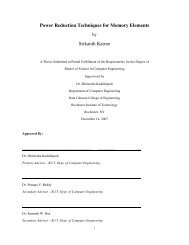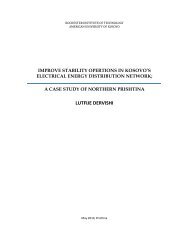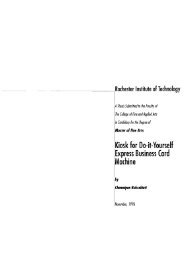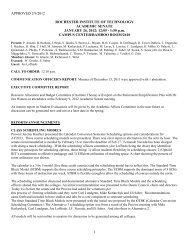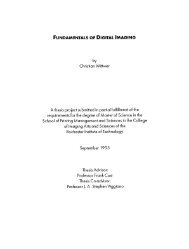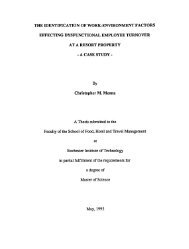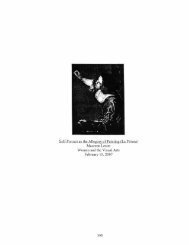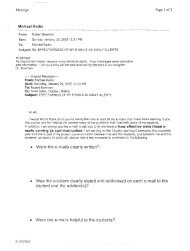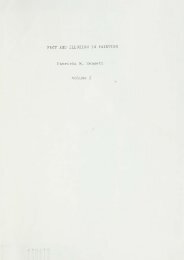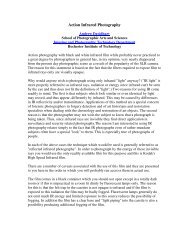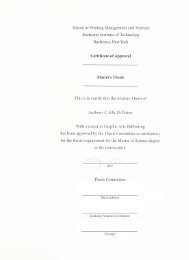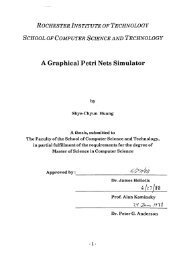Sophism and Moral Agnosticism, Or, How to Tell a Relativist from a ...
Sophism and Moral Agnosticism, Or, How to Tell a Relativist from a ...
Sophism and Moral Agnosticism, Or, How to Tell a Relativist from a ...
Create successful ePaper yourself
Turn your PDF publications into a flip-book with our unique Google optimized e-Paper software.
9° THE PLURALIST 6: I 20II<br />
Macintyre formulates the "relativist challenge": faced with competing claims<br />
ofrival traditions, the unprejudiced judge will soon find that each tradition<br />
has its own st<strong>and</strong>ards of rationality or "background beliefs." Appealing <strong>to</strong><br />
any of these st<strong>and</strong>ards entails the assumption ofthe st<strong>and</strong>point of the tradition<br />
in which they are expressed. Yet we need not assume such a st<strong>and</strong>point,<br />
<strong>and</strong> if we do not, then we can find no good reason <strong>to</strong> prefer one tradition<br />
<strong>to</strong> any other. Rational, propositional claims may be issued according <strong>to</strong> the<br />
background beliefs ofa particular tradition, bur they cannot be shown <strong>to</strong> be<br />
rational as such. MacIntyre concludes: "Every set of st<strong>and</strong>ards, every tradition<br />
incorporating a set of st<strong>and</strong>ards, has as much <strong>and</strong> as little claim <strong>to</strong> our<br />
allegiance as any other. Let us call this the relativist challenge. "6<br />
After thus critiquing the Enlightenment notion ofrational justification,<br />
MacIntyre hopes <strong>to</strong> offer another approach-one he believes overcomes the<br />
relativist challenge. He endeavors <strong>to</strong> propose a way in which rival traditions<br />
can be evaluated without appealing <strong>to</strong> any normative measure ofrational justification.<br />
So, MacIntyre proposes that we begin by identifying the endemic<br />
features ofany tradition <strong>and</strong> that we examine its structural presuppositions.<br />
Though these structural presuppositions are not intrinsically bound <strong>to</strong> any<br />
particular tradition, MacIntyre holds that they afford the opportunity <strong>to</strong><br />
measure how well the structure maintains its integrity over time <strong>and</strong> against<br />
epistemic challenges. MacIntyre holds that beliefs, institutions, <strong>and</strong> communal<br />
practices are always in a state of relative change, but he means <strong>to</strong> put<br />
this changefulness <strong>to</strong> work <strong>to</strong> answer the charge of relativism.<br />
Macintyre explains that a given tradition may develop in a number of<br />
ways, one of which is in relation <strong>to</strong> the founding texts <strong>and</strong> authorities of<br />
the tradition itself. A text or an oral his<strong>to</strong>ry can be challenged, <strong>and</strong> interpretations<br />
of it can be debated. MacIntyre also argues that incoherence <strong>and</strong><br />
inconsistency in a given traditional set of beliefs can become evident over<br />
time. New situations <strong>and</strong> dem<strong>and</strong>s may emerge environmentally, for example,<br />
<strong>and</strong> contact with other traditions may give rise <strong>to</strong> new sets ofproblems <strong>and</strong><br />
questions. Those in challenged traditions are then forced <strong>to</strong> address new developments,<br />
should they wish <strong>to</strong> avoid a crisis in their tradition. In part, the<br />
way that challenges <strong>to</strong> a given tradition are addressed will be the product of<br />
the analytical <strong>to</strong>ols native <strong>to</strong> that tradition. Likewise, the response <strong>to</strong> these<br />
inevitable challenges will determine how traditions develop or disintegrate.<br />
Imagine a tradition tbat wants <strong>to</strong> incorporate in<strong>to</strong> its fold both passages<br />
quoted earlier <strong>from</strong> the Book ofLeviticus <strong>and</strong> the Epistle <strong>to</strong> the Galatians, as<br />
a tradition dealing with such an epistemological challenge.<br />
In some cases, certain belief> will need <strong>to</strong> be rejected for the sake ofgreater



